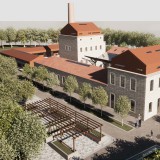Supervisor:
2021
This dissertation deals with the reuse and restoration of the VOTRYS factory in Seplia, Attica. Today, Sepolia is one of the most densely populated areas of Athens, in which a number of industries were built at the beginning of the previous century, as at that time the area was outside the urban fabric. One of them was the VOTRYS winery, which was created in order to absorb and utilize the resulting raisin surplus, as a result of the raisin crisis. It operated uninterruptedly until the mid-1980s, when it closed. Since then, it has been left to the ravages of time, with the consequences of long-term abandonment quite evident.
The new use that we study and propose for the specific industrial complex is the co-housing of a nursing home with an orphanage. The coexistence of these two social structures will be based on the beneficial properties that have been supported from time to time by scientific studies of such an interaction. Although the two social groups seem to be quite conflicting, due to the large age gap that exists between them and the consequently different needs of each, however both children and the elderly are dominated by negative emotions, such as loneliness, abandonment and the lack of family warmth. Thus, they both have a great need to feel the love, affection and feeling that they have enough people to interact with them.
However, due to the different needs of each social group, it was deemed necessary for the two social structures to be fully autonomous, with several outdoor and indoor spaces, in which joint activities will take place. Finally, it should be noted that special emphasis has been given to this work, both in the ways of restoring existing buildings and erecting new additions with respect to the particular architectural features of the factory, and in the effort to integrate in the design of bioclimatic parameters.
